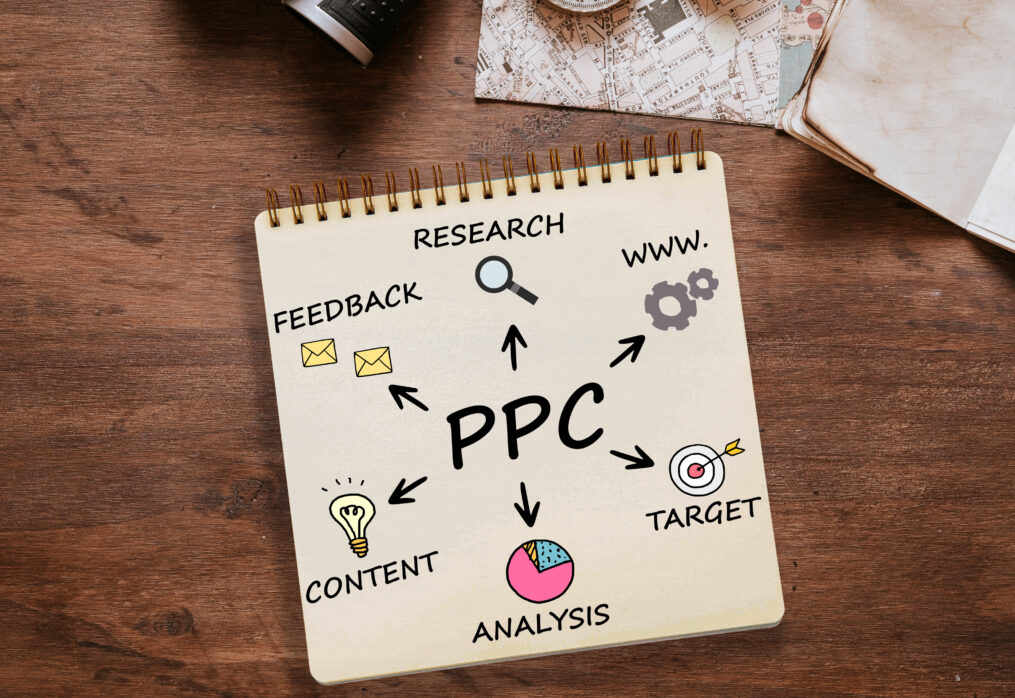How does PPC advertising work?
Pay-per-click (PPC) advertising is a digital marketing model where advertisers pay a fee each time their ad is clicked. It’s a way of buying visits to your site, rather than attempting to “earn” those visits organically through techniques like search engine optimization (SEO).
Here’s how PPC works:
- Ad Placement: Advertisers bid on specific keywords relevant to their target audience. These keywords are what users might type into a search engine when looking for products or services.
- Auction System: Search engines like Google and Bing use an auction system to determine which ads to show for a given search query. This involves factors like bid amount, ad quality, relevance, and the expected click-through rate (CTR).
- Ad Rank: The position of your ad in search results is determined by your ad rank. Ad rank is calculated by multiplying your maximum bid by your Quality Score (a metric that measures the relevance and quality of your ads, keywords, and landing pages).
- Ad Display: When a user searches for a keyword you’re targeting, the search engine runs an auction based on various factors including bid amount and quality score. If your ad wins the auction, it gets displayed in a prominent position on the search engine results page (SERP).
- Cost: You’re charged only when someone clicks on your ad. The amount you pay per click depends on several factors, including the competitiveness of the keyword, the quality of your ad, and your bid.
- Campaign Management: PPC campaigns require ongoing management to optimize performance. This includes keyword research, ad creation and testing, bid management, and performance monitoring.
PPC advertising offers several benefits:
- Instant Visibility: Your ads can appear at the top of search results almost instantly, driving immediate traffic to your website.
- Targeted Reach: You can target your ads to specific geographic locations, demographics, interests, and even the device types of your audience.
- Measurable Results: PPC platforms provide detailed analytics and reporting tools, allowing you to track the performance of your campaigns in real-time.
- Flexible Budgeting: You have full control over your budget, allowing you to adjust spending based on performance and business objectives.
However, PPC also has its challenges:
- Competition: Popular keywords can be highly competitive, leading to higher bid prices and increased costs.
- Complexity: Managing PPC campaigns effectively requires knowledge of the platform, keyword research, ad copywriting, and data analysis.
- Cost Management: Without proper optimization, PPC campaigns can quickly become expensive without delivering the desired results.
Overall, PPC advertising can be a powerful tool for driving targeted traffic and generating leads or sales, but it requires careful planning, execution, and ongoing optimization to achieve success.
Calculating the cost of a pay-per-click (PPC) campaign involves several factors. Here’s a step-by-step guide to help you understand how PPC costs are calculated:
- Determine Your Budget: Decide how much you’re willing to spend on your PPC campaign. This could be a daily budget or a total budget for the campaign duration.
- Keyword Research: Identify relevant keywords related to your products or services. Use keyword research tools to determine the average cost per click (CPC) for each keyword.
- Estimate Click-through Rate (CTR): Estimate the percentage of people who will click on your ad when it’s displayed. This can vary based on factors like ad position, ad copy, and targeting.
- Calculate Cost Per Click (CPC): Multiply the estimated CPC for each keyword by your estimated CTR. This gives you the cost per click for each keyword. For example:CPC = Keyword’s Average CPC × Estimated CTR
- Set Bids: Based on your budget and the CPCs of your chosen keywords, set bids for each keyword. Your bid represents the maximum amount you’re willing to pay for a click on that keyword.
- Monitor Performance: Keep track of your campaign’s performance, including the number of clicks, click-through rate, conversions, and cost.
- Adjust Bids: Regularly review your campaign performance and adjust your bids as needed. You may need to increase bids for high-performing keywords or decrease bids for underperforming ones.
- Calculate Total Cost: Multiply the number of clicks by the CPC to calculate the total cost of your campaign. For example:Total Cost = Number of Clicks × CPC
- Analyze ROI: Evaluate the return on investment (ROI) of your PPC campaign by comparing the total cost to the revenue generated from conversions. Adjust your campaign strategy based on the ROI and overall performance.
Remember that PPC costs can vary widely depending on factors like keyword competitiveness, industry, ad quality, and targeting options. It’s essential to continuously monitor and optimize your campaigns to maximize results within your budget.
Also Read:
9 Steps to solid Brand Awareness Strategy! https://smallbusinessideas.online/9-steps-to-solid-brand-awareness-strategy-2024/
Common SEO Mistakes to Avoid!https://dmagic.in/10-common-seo-mistakes-to-avoid/
